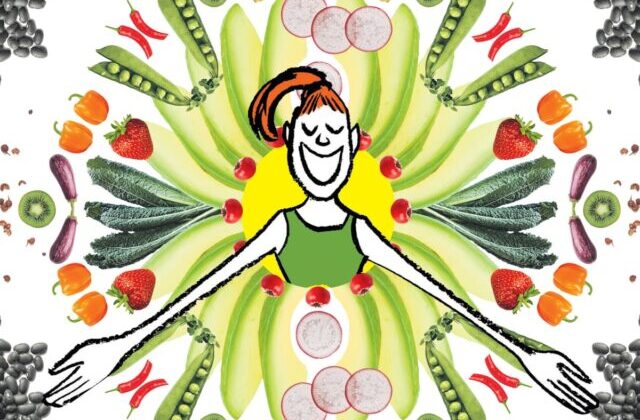
A vegan diet can have a good impact on the environment and your health; it’s more than simply a fad. Making the switch to plant-based diets benefits both your health and the environment by promoting sustainability.
Let’s explore the many advantages of a vegan diet, including better health and a smaller environmental impact. And worry not—it’s never been simpler to find vegetarian dishes to enjoy this way of life!
Benefits for your health

- Heart Health: Research has shown that a vegan diet can reduce the risk of heart disease. Eliminating animal products’ saturated fats promotes heart health by keeping cholesterol levels within normal ranges.
- Weight management: Plant-based diets are beneficial for managing weight since they often contain fewer calories and saturated fats. Furthermore, a diet high in fibre keeps you full and content.
- Decreased Diabetes Risk: Studies indicate that a vegan diet may reduce the risk of type 2 diabetes by enhancing insulin sensitivity and improving blood sugar regulation.
- Cancer Prevention: People who live a vegan lifestyle have a lower risk of developing some cancers, notably colorectal cancer. Consuming a lot of fruits, vegetables, and antioxidant-rich foods can help prevent cancer.
- Better Digestion: A vegan diet’s high fibre content aids in good digestion, avoiding constipation and fostering gut health.
Campaigning For a Greener Earth

- Reduced Greenhouse Gas Emissions: One of the main causes of greenhouse gas emissions is animal husbandry. You may lessen climate change and your carbon footprint by eating a plant-based diet.
- Water Resource Conservation: Growing meat uses a substantially larger amount of water than growing crops. Going vegan contributes to water resource conservation for a sustainable future.
- Forest preservation: In order to create space for grazing areas or to raise animal feed, animal agriculture frequently results in deforestation. Making the switch to veganism will help preserve biodiversity and forests.
- Mitigation of Water Pollution: One of the main causes of water pollution is animal waste overflow from factory farms. Eating veganism lowers the need for industrial farming, which lowers the risk of water contamination.
- Protection of Wildlife: Animal agribusiness has the potential to destroy wildlife habitats and wipe out entire species. Selecting plant-based foods contributes to the preservation of various ecosystems and the animals that live there.
Some Tasty Vegetarian Recipes

It’s not necessary to give up flavour and variety when switching to a vegan diet. You will, in fact, come across an abundance of delicious and nutritious vegetarian recipes for your everyday meals.
- Power-Powered Breakfast: To start the day, have a large bowl of muesli with nuts, seeds and fresh fruit on top. It’s a delicious, high-fibre, energy-boosting treat.
- Lunch Salads: Prepare vibrant salads with a range of greens, veggies, and legumes along with a delectable homemade dressing. There will be a taste explosion with each bite.
- Filling Vegetable Burgers: Assemble your own vegetarian burgers with spices, beans, lentils, and mushrooms. To create a filling lunch, combine them with whole grain buns and your preferred toppings.
- Tasty Stir-Fries: For a quick and tasty stir-fry, mix a variety of vegetables, tofu or tempeh, and your preferred sauce. For a full dinner, serve over quinoa or brown rice.
- Soul-satisfying Soups: Try out these hearty soups that are packed with nutritious grains, lentils, and vegetables. On frigid days, they’re ideal for bringing warmth to your spirit.
- Delightful Sweets: It’s true that vegan sweets can be equally rich and creamy! Try making plant-based cakes, ice creams, and cookies with healthy ingredients.
Nutritional Considerations for Vegans

While the vegan diet boasts numerous health benefits, it requires a conscious effort to ensure all essential nutrients are adequately met. Particularly critical for vegans are vitamin B12, iron, calcium, and omega-3 fatty acids.
Vitamin B12: This vitamin is primarily found in animal products, but vegans can obtain it from fortified cereals, plant-based milk, and B12 supplements.
Iron: Though abundant in plant foods like lentils, tofu, and quinoa, plant-based iron is not as readily absorbed. Combining it with vitamin C-rich foods, such as citrus fruits, can enhance absorption.
Calcium: Swap dairy milk for fortified plant milk like almond or soy. Also, leafy greens and tahini are calcium-rich alternatives.
Omega-3 fatty acids: Instead of fish, turn to chia seeds, walnuts, and flaxseeds.
If you decide to implement vitamins in your diet from supplement sources, get to know how to tell high from low-quality ones and make an informed decision before purchasing.
Economic and Accessibility Aspects of Veganism

One misconception is that veganism is pricey and less reachable, especially in regions with scarce vegan-specific goods or fresh produce. However, a vegan lifestyle can be both affordable and accessible.
Tips for Economical Vegan Living:
Bulk buying grains and legumes can result in significant savings.
Prioritize local markets for seasonal produce at lower prices.
DIY vegan alternatives, like nut milk or vegan cheeses, can be more cost-effective than store-bought versions.
Always lookout for deals and discounts in supermarkets or online.
Ethical and Moral Motivations
For many, veganism is less about health and more about ethical beliefs. It stems from a desire to not partake in or endorse practices harmful to animals.
Embracing veganism aligns with principles of compassion, emphasizing kindness and respect for all living beings. Documentaries, firsthand accounts from farms, and philosophical literature offer deep dives into this facet of veganism.
Local and Seasonal Eating

Choosing local and seasonal vegan foods is a sustainable choice. It reduces carbon footprints linked with long-distance transportation and bolsters local agriculture. A visit to the local farmer’s market not only supports the community but ensures the freshness of produce, enhancing the nutritional value of meals.
Navigating Social and Cultural Factors
Transitioning to veganism can sometimes clash with cultural or social norms. Celebrations, family dinners, or eating out may pose challenges.
Effective Strategies:
Educate close friends and family about your reasons for going vegan.
Offer to bring a vegan dish to gatherings.
Seek out vegan-friendly restaurants or consult chefs in advance about vegan options.
Join local vegan groups for support, resources, and camaraderie.
Conclusion
Veganism, while rewarding, requires informed choices. Whether it’s about getting the right nutrients, economizing your diet, or aligning your meals with ethical beliefs, each step offers its challenges and triumphs.
As with any significant lifestyle change, research, and a supportive community can make the journey smoother.
The road to better health and a more sustainable environment is a vegan diet. Adopting a plant-based diet helps you to benefit from enhanced health and lessen your environmental footprint.
Benefits from this go well beyond your plate, impacting international efforts towards sustainability. Remember that discovering vegetarian dishes is a joyful trip that leads to an endless array of flavours, textures, and creative culinary possibilities as you set out on this quest.
By feeding your body with plant-based nutrition, you can take a positive step towards a healthy you and a healthier Earth.












